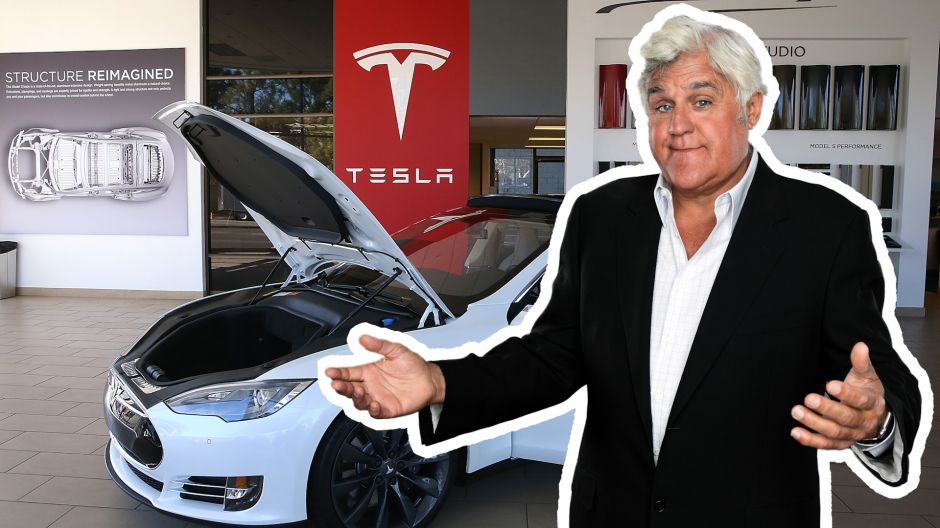

Firmware
Tesla enthusiast Jay Leno talks self-driving cars and the future of the automobile
Veteran talk show host and iconic comedian Jay Leno knows a thing or two about cars. Before he made a name for himself on television, Leno had his start as a “lot boy” in a Ford dealership. His first forays into stand-up comedy were also supported by work he did at another auto dealership.
Now 68-years-old, Jay Leno is retired from regular TV work, but not from his passion for cars. He currently hosts Jay Leno’s Garage on CNBC, a show where he showcases vehicles that are unique and noteworthy. Among these were the Tesla Model S, which was featured back in a segment back in 2012, and more recently, the next-generation Tesla Roadster, which unleashed the iconic host’s inner child.
Being a veteran of the auto industry and a man who has interacted with thousands of vehicles during his long and storied career, Jay Leno’s views on the future of cars are something that deserves much consideration. Some of these were recently related in a segment of CNBC Make It, where Leno discussed what he believes the auto industry will be like 20 years from now, and how people would likely adapt to the emergence of self-driving technologies.
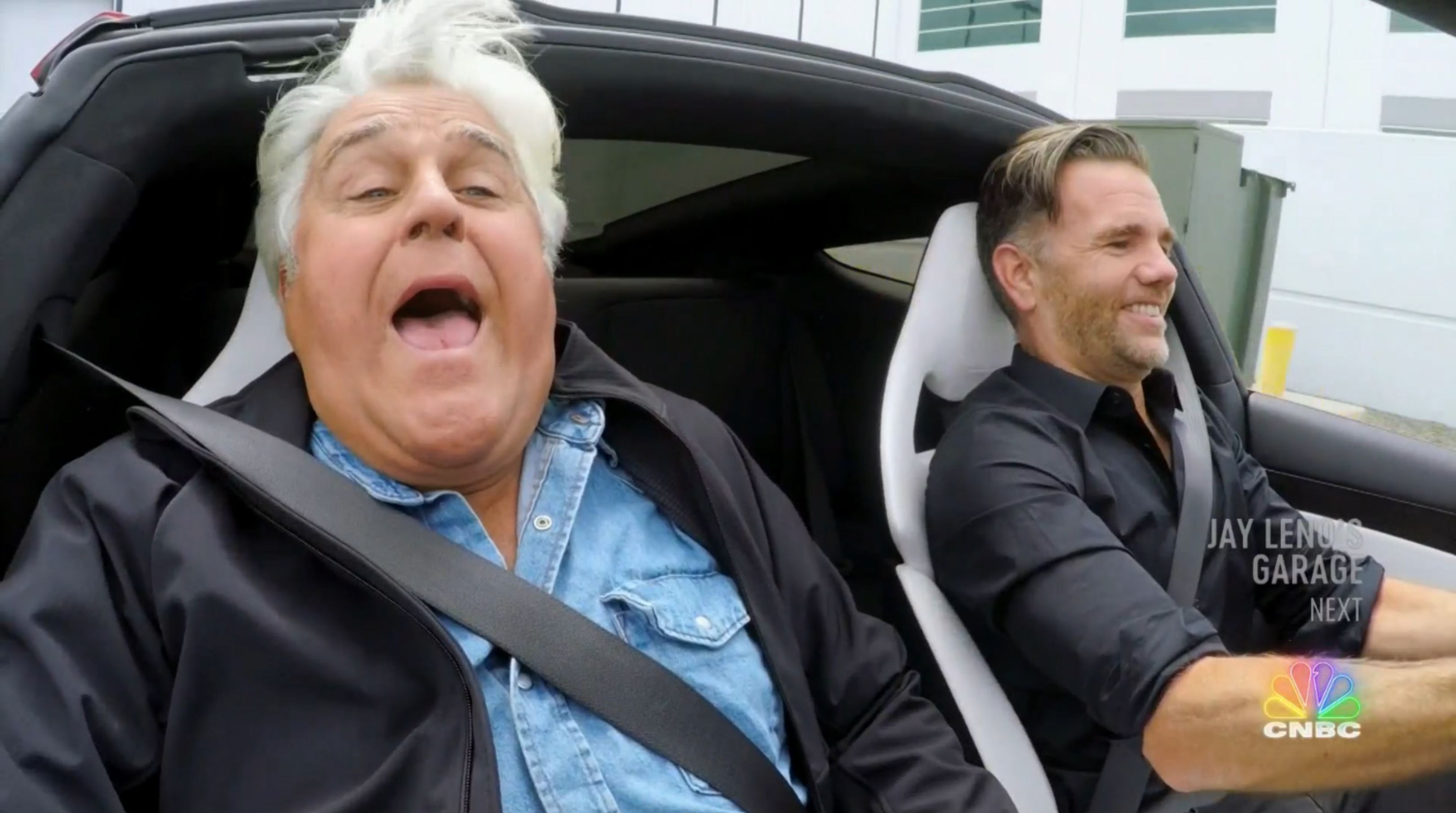
During the segment, Leno noted that vehicles would likely abandon the ignition key in 20 years. The veteran talk show host believes that the auto industry would probably transition to using systems similar to what Tesla is adopting today.
“I think you’ll lose the ignition key. That will be gone in 20 years. You just get in your car and either through your phone or some electronic device; it knows it’s you and you pull away, much like Tesla does now,” Leno said.
Leno believes that self-driving cars are indeed the future, though the transition to their widespread use will likely take some time. That said, the auto veteran noted that the reservations of people over self-driving technologies are similar to the pushback the car industry felt when it was introducing features that have now become standard.
“It’s not like all of a sudden people flip over to self-driving cars. But it’s the same thing that happened when anti-lock brakes came out: People said, ‘I don’t want some computer doing the braking in my car. I want to step on my car.’ Or power steering: ‘I like to feel the road. I’m not going to get power steering.’ Well, all these things eventually become — well, they just get adapted to cars and you sort of move on.”
“People don’t realize, in the old days, you had to adjust the choke, you had to adjust the spark advance to retard or advance the ignition. There are a lot of things to do in a car. You had to shift gears by hand, and eventually, all of those things happened automatically. And I think that’s what will happen.”
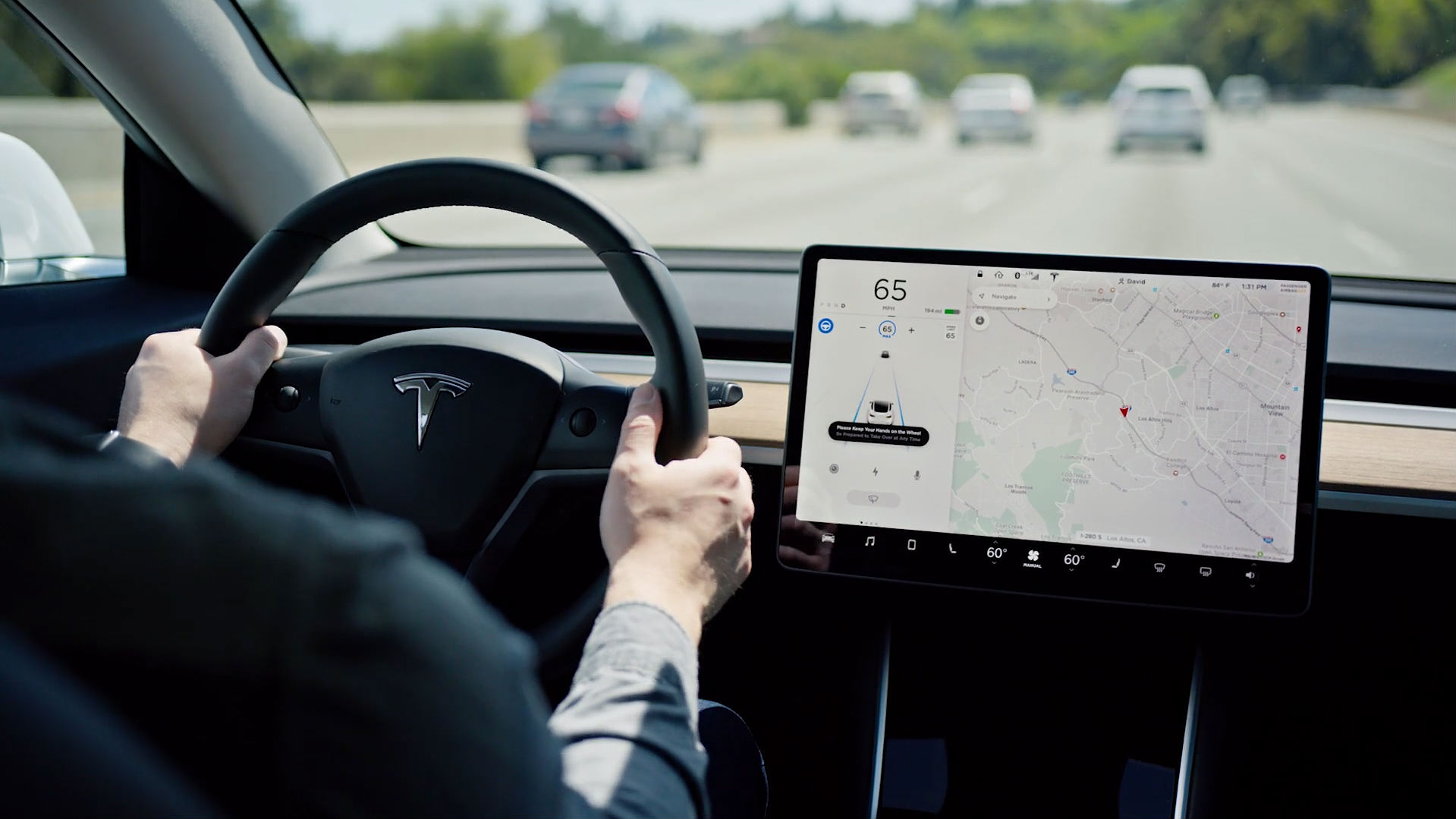
Ultimately, Leno believes that the shift of the auto industry towards autonomy and the emergence of companies like Tesla, which are as focused on software as they are on hardware, are bound to encounter some pushback. Leno compared the upcoming shift in the auto sector with the developments in life-saving medical procedures, particularly those that have triggered strong adverse reactions in the past.
“I can remember when Barney Clark, who was the world’s oldest living heart transplant, got a heart transplant. People were protesting: ‘You’re taking the heart from one man and putting it in another. It’s the work of the devil. It’s a horrible thing.’ Now heart transplants are as common as any other kind of medical procedure. So I think it just takes a while, but eventually it becomes evolutionary,” he said.
Jay Leno owns a Tesla himself, driving up to the company’s design center to experience the next-generation Roadster in his very own original Tesla Roadster. In previous interviews, Leno has openly expressed his support for the company, stating that he does not understand the overwhelming amount of flak that Tesla is receiving. The veteran host also aired his thoughts on some of the criticisms being directed towards Tesla, particularly around the federal tax credit being extended towards the company’s buyers.
“I do own a Tesla. I like them very much. I mean, I think it really is the future. I like the fact that Tesla is an American company, using American workers, using locally-sourced materials. So I never quite understand the negative vibes you sometimes get.
“People push back; they don’t like the fact that you get money back from the government. You know, I don’t really go to sporting events, but I have to pay for stadiums. I don’t have kids, but I have to pay for schools. So, I don’t mind some of my tax dollars contributing to infrastructure to make air cleaner and cars more efficient. So no, I’m a big fan,” he said.
Firmware
Tesla mobile app shows signs of upcoming FSD subscriptions
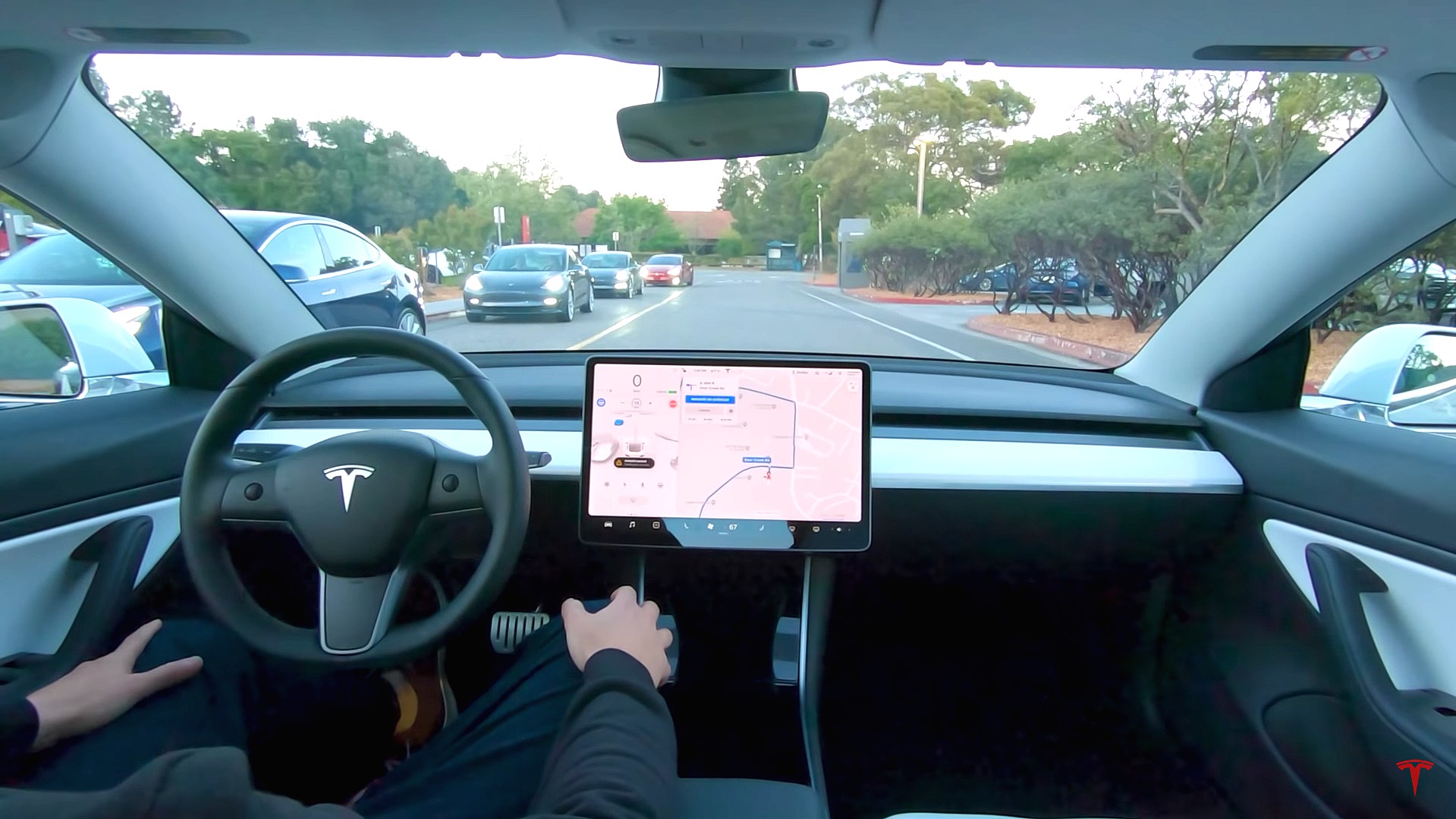
It appears that Tesla may be preparing to roll out some subscription-based services soon. Based on the observations of a Wales-based Model 3 owner who performed some reverse-engineering on the Tesla mobile app, it seems that the electric car maker has added a new “Subscribe” option beside the “Buy” option within the “Upgrades” tab, at least behind the scenes.
A screenshot of the new option was posted in the r/TeslaMotors subreddit, and while the Tesla owner in question, u/Callump01, admitted that the screenshot looks like something that could be easily fabricated, he did submit proof of his reverse-engineering to the community’s moderators. The moderators of the r/TeslaMotors subreddit confirmed the legitimacy of the Model 3 owner’s work, further suggesting that subscription options may indeed be coming to Tesla owners soon.
Did some reverse engineering on the app and Tesla looks to be preparing for subscriptions? from r/teslamotors
Tesla’s Full Self-Driving suite has been heavily speculated to be offered as a subscription option, similar to the company’s Premium Connectivity feature. And back in April, noted Tesla hacker @greentheonly stated that the company’s vehicles already had the source codes for a pay-as-you-go subscription model. The Tesla hacker suggested then that Tesla would likely release such a feature by the end of the year — something that Elon Musk also suggested in the first-quarter earnings call. “I think we will offer Full Self-Driving as a subscription service, but it will be probably towards the end of this year,” Musk stated.
While the signs for an upcoming FSD subscription option seem to be getting more and more prominent as the year approaches its final quarter, the details for such a feature are still quite slim. Pricing for FSD subscriptions, for example, have not been teased by Elon Musk yet, though he has stated on Twitter that purchasing the suite upfront would be more worth it in the long term. References to the feature in the vehicles’ source code, and now in the Tesla mobile app, also listed no references to pricing.
The idea of FSD subscriptions could prove quite popular among electric car owners, especially since it would allow budget-conscious customers to make the most out of the company’s driver-assist and self-driving systems without committing to the features’ full price. The current price of the Full Self-Driving suite is no joke, after all, being listed at $8,000 on top of a vehicle’s cost. By offering subscriptions to features like Navigate on Autopilot with automatic lane changes, owners could gain access to advanced functions only as they are needed.
Elon Musk, for his part, has explained that ultimately, he still believes that purchasing the Full Self-Driving suite outright provides the most value to customers, as it is an investment that would pay off in the future. “I should say, it will still make sense to buy FSD as an option as in our view, buying FSD is an investment in the future. And we are confident that it is an investment that will pay off to the consumer – to the benefit of the consumer.” Musk said.
Firmware
Tesla rolls out speed limit sign recognition and green traffic light alert in new update
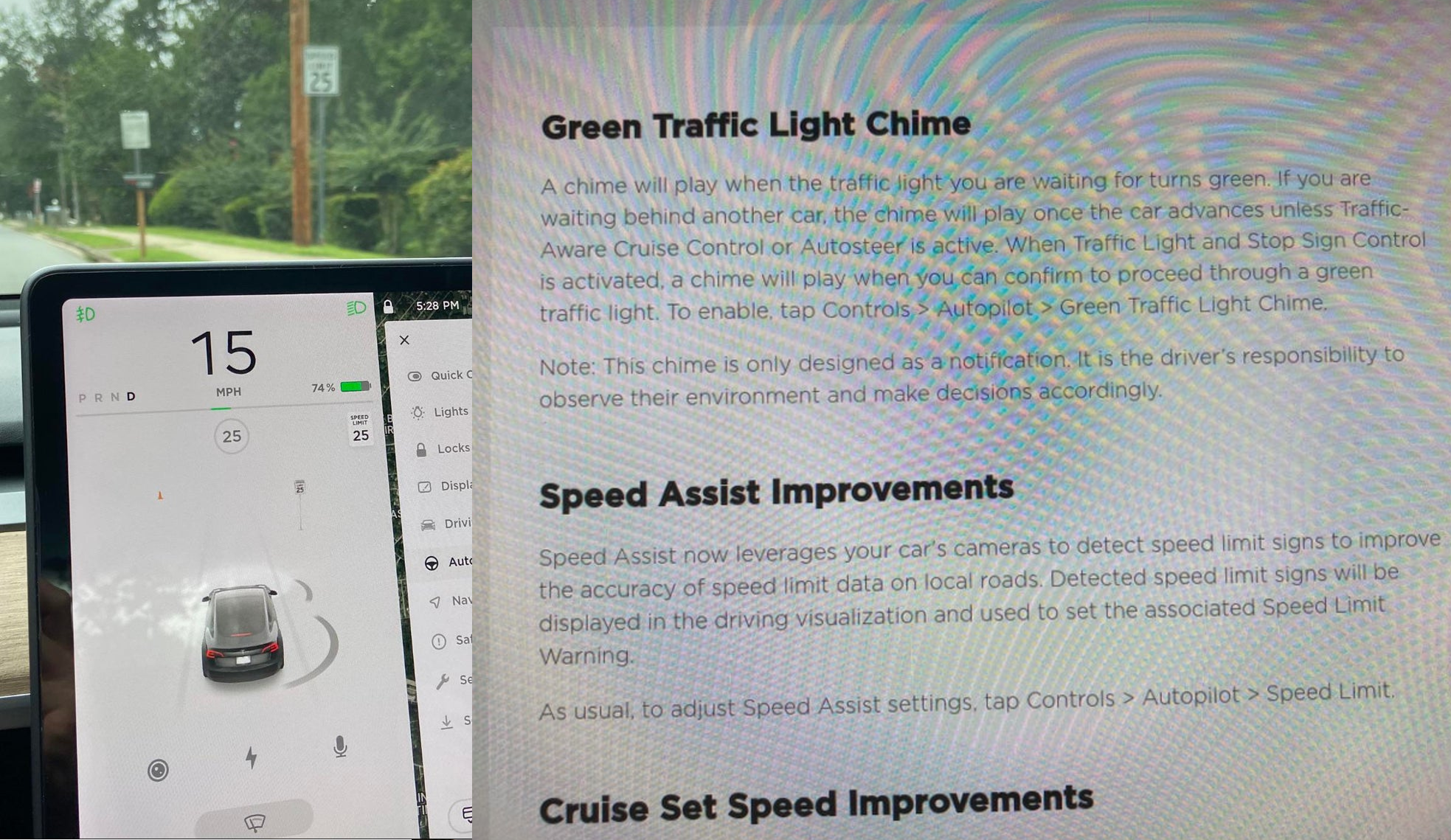
Tesla has started rolling out update 2020.36 this weekend, introducing a couple of notable new features for its vehicles. While there are only a few handful of vehicles that have reportedly received the update so far, 2020.36 makes it evident that the electric car maker has made some strides in its efforts to refine its driver-assist systems for inner-city driving.
Tesla is currently hard at work developing key features for its Full Self-Driving suite, which should allow vehicles to navigate through inner-city streets without driver input. Tesla’s FSD suite is still a work in progress, though the company has released the initial iterations of key features such Traffic Light and Stop Sign Control, which was introduced last April. Similar to the first release of Navigate on Autopilot, however, the capabilities of Traffic Light and Stop Sign Control were pretty basic during their initial rollout.
2020.36 Showing Speed Limit Signs in Visualization from r/teslamotors
With the release of update 2020.36, Tesla has rolled out some improvements that should allow its vehicles to handle traffic lights better. What’s more, the update also includes a particularly useful feature that enables better recognition of speed limit signs, which should make Autopilot’s speed adjustments better during use. Following are the Release Notes for these two new features.
Green Traffic Light Chime
“A chime will play when the traffic light you are waiting for turns green. If you are waiting behind another car, the chime will play once the car advances unless Traffic-Aware Cruise Control or Autosteer is active. When Traffic Light and Stop Sign Control is activated, a chime will play when you can confirm to proceed through a green traffic light. To enable, tap Controls > Autopilot > Green Traffic Light Chime.
“Note: This chime is only designed as a notification. It is the driver’s responsibility to observe their environment and make decisions accordingly.”
Speed Assist Improvements
“Speed Assist now leverages your car’s cameras to detect speed limit signs to improve the accuracy of speed limit data on local roads. Detected speed limit signs will be displayed in the driving visualization and used to set the associated Speed Limit Warning.
“As usual, to adjust Speed Assist settings, tap Controls > Autopilot > Speed Limit.”
Footage of the new green light chime in action via @NASA8500 on Twitter ✈️ from r/teslamotors
Amidst the rollout of 2020.36’s new features, speculations were abounding among Tesla community members that this update may include the first pieces of the company’s highly-anticipated Autopilot rewrite. Inasmuch as the idea is exciting, however, Tesla CEO Elon Musk has stated that this was not the case. While responding to a Tesla owner who asked if the Autopilot rewrite is in “shadow mode” in 2020.36, Musk responded “Not yet.”
Firmware
Tesla rolls out Sirius XM free three-month subscription
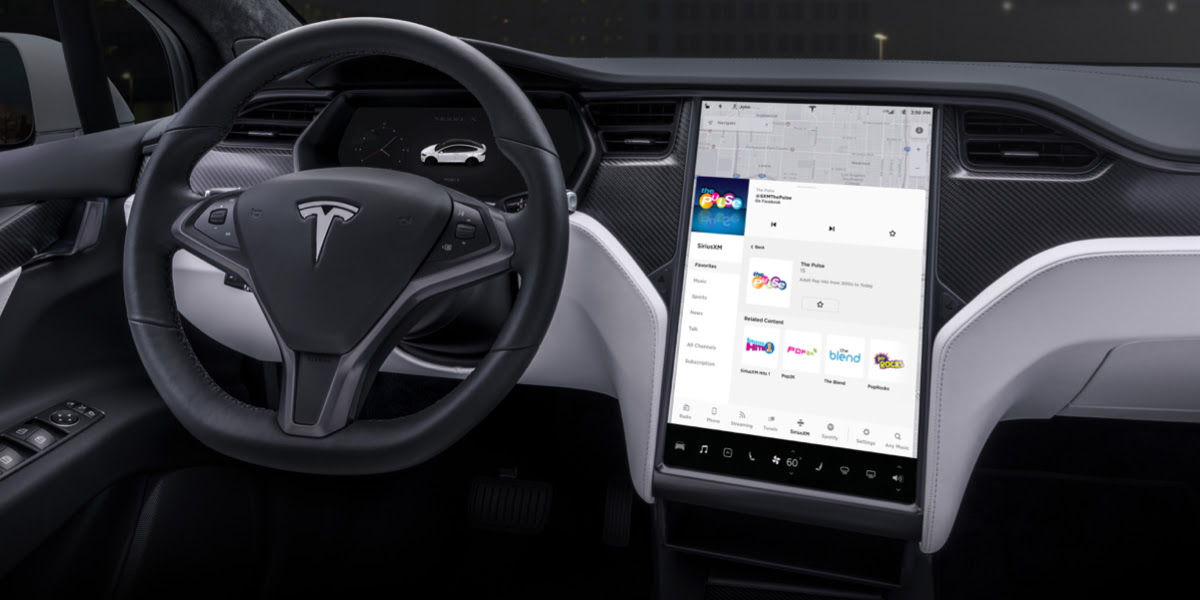
Tesla has rolled out a free three-month trial subscription to Sirius XM, in what appears to be the company’s latest push into making its vehicles’ entertainment systems more feature-rich. The new Sirius XM offer will likely be appreciated by owners of the company’s vehicles, especially considering that the service is among the most popular satellite radios in the country today.
Tesla announced its new offer in an email sent on Monday. An image that accompanied the communication also teased Tesla’s updated and optimized Sirius XM UI for its vehicles. Following is the email’s text.
“Beginning now, enjoy a free, All Access three-month trial subscription to Sirius XM, plus a completely new look and improved functionality. Our latest over-the-air software update includes significant improvements to overall Sirius XM navigation, organization, and search features, including access to more than 150 satellite channels.
“To access simply tap the Sirius XM app from the ‘Music’ section of your in-car center touchscreen—or enjoy your subscription online, on your phone, or at home on connected devices. If you can’t hear SiriusXM channels in your car, select the Sirius XM ‘Subscription’ tab for instruction on how to refresh your audio.”
Tesla has actually been working on Sirius XM improvements for some time now. Back in June, for example, Tesla rolled out its 2020.24.6.4 update, and it included some optimizations to its Model S and Model X’s Sirius XM interface. As noted by noted Tesla owner and hacker @greentheonly, the source code of this update revealed that the Sirius XM optimizations were also intended to be released to other areas such as Canada.
Interestingly enough, Sirius XM is a popular feature that has been exclusive to the Model S and X. Tesla’s most popular vehicle to date, the Model 3, is yet to receive the feature. One could only hope that Sirius XM integration to the Model 3 may eventually be included in the future. Such an update would most definitely be appreciated by the EV community, especially since some Model 3 owners have resorted to using their smartphones or third-party solutions to gain access to the satellite radio service.
The fact that Tesla seems to be pushing Sirius XM rather assertively to its customers seems to suggest that the company may be poised to roll out more entertainment-based apps in the coming months. Apps such as Sirius XM, Spotify, Netflix, and YouTube, may seem quite minor when compared to key functions like Autopilot, after all, but they do help round out the ownership experience of Tesla owners. In a way, Sirius XM does make sense for Tesla’s next-generation of vehicles, especially the Cybertruck and the Semi, both of which would likely be driven in areas that lack LTE connectivity.
-

 Elon Musk4 days ago
Elon Musk4 days agoTesla investors will be shocked by Jim Cramer’s latest assessment
-

 News1 week ago
News1 week agoTesla Robotaxi’s biggest challenge seems to be this one thing
-

 Elon Musk2 weeks ago
Elon Musk2 weeks agoFirst Look at Tesla’s Robotaxi App: features, design, and more
-

 News2 weeks ago
News2 weeks agoSpaceX and Elon Musk share insights on Starship Ship 36’s RUD
-

 News2 weeks ago
News2 weeks agoWatch Tesla’s first driverless public Robotaxi rides in Texas
-

 News1 week ago
News1 week agoWatch the first true Tesla Robotaxi intervention by safety monitor
-

 News2 weeks ago
News2 weeks agoTesla has started rolling out initial round of Robotaxi invites
-

 Elon Musk2 weeks ago
Elon Musk2 weeks agoTesla to launch in India in July with vehicles already arriving: report

















